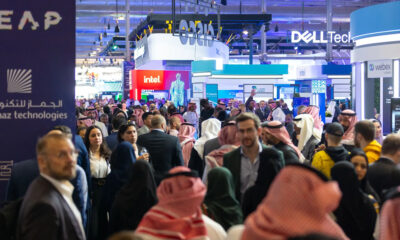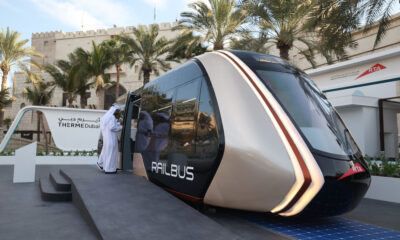News
Saudi Researchers Use Quantum Computing To Design More Efficient Airplanes
To build its quantum expertise, KAUST has partnered with Zapata Computing, a quantum software company based in Boston, Massachusetts.

It’s estimated that air travel produces roughly two percent of all greenhouse gas emissions. That alone is a good enough reason to explore innovative designs and create more efficient airplanes, but there’s also the fact that airlines operate on very slim margins, so every bit of fuel they manage to save can go a long way in helping them make more profit.
While computers have been helping engineers and designers optimize the aerodynamic properties of airplanes for decades, researchers at King Abdullah University of Science and Technology (KAUST) are the first to explore the absolute cutting edge of what is currently possible in science and engineering by using quantum computing.
Unlike regular computers, which can, at the most fundamental level, represent only two states using transistors (0 = off, 1 = on), quantum computers can be in a 1 or 0 quantum state, or in a superposition of the 1 and 0 state, which essentially means that they can be on and off at the same time. This allows them to represent all possible system states simultaneously, massively speeding up certain specialized computations.
To build its quantum expertise, KAUST has partnered with Zapata Computing, a quantum software company based in Boston, Massachusetts. Zapata will provide its Orquestra toolset, which promises to greatly simplify the process of conducting research in quantum computing.
Also Read: Turkish Healthcare Startup Uses Nanotech To Destroy Tumors
“Quantum computing is still very novel, but it’s going to be a truly disruptive technology that will provide enormous cross-industry opportunities,” said Matteo Parsani, Assistant Professor of Applied Mathematics and Computational Science at KAUST. “Building a knowledge base of quantum expertise at KAUST in the interdisciplinary field of computational fluid dynamics can only be a good thing both for the university and for the Kingdom.”
The potential of quantum computing to accelerate progress the same way traditional computers have is truly immense, but the technology is still in its infancy, and it may take researchers some time to produce useful results. Hopefully, the team at KAUST will be able to design more efficient airplanes taking us further in a cleaner fashion.
News
Yabi Introduces AI Financial Coach For Smarter Money Moves
The app provides real-time, personalized financial guidance, helping UAE residents manage money smarter, reduce debt, and build wealth effortlessly.

Imagine having 24/7 access to an expert financial advisor — someone who understands your spending habits, helps you save more effectively, and offers guidance for every financial decision. That’s the vision behind Yabi’s revamped platform, an AI-driven finance app designed to transform personal finance management in the UAE.
Unlike traditional budgeting tools, Yabi acts as an always-available AI advisor, analyzing your unique spending patterns and offering real-time, tailored financial advice. Whether you’re making everyday purchases, planning a big trip, or saving for a major milestone, Yabi keeps you on track and helps you make informed financial choices.
Rakhil Fernando, CEO of Yabi, explains the mission behind the platform: “Financial literacy is not optional — it’s essential. But most financial tools today feel outdated and overly complex. Yabi is here to change that by offering AI-powered financial coaching that’s smart, simple, and accessible to everyone in the UAE”.
Here are some of the updated app’s new features:
- AI-Powered Financial Coach: A 24/7 digital advisor providing real-time financial guidance based on your spending habits and available in multiple languages.
- Live Insights: Connect your bank accounts for a detailed breakdown of your expenses.
- Tailored Budgeting: Yabi creates a budget that fits with your actual spending habits rather than generic financial advice.
- Interactive Financial Education: Learn the essentials of saving, investing, and credit management through engaging content integrated into the AI experience.
- Automated Expense Tracking: Receive instant alerts on overspending, identify hidden charges, and cut unnecessary subscriptions with ease.
- Credit Score & Financial Health Monitoring: Get free credit score checks and AI-driven recommendations to enhance your financial standing.
Also Read: A Guide To Digital Payment Methods In The Middle East
Finally, Yabi is also gearing up to introduce its own debit card and a suite of financial products, making it easier to save, spend, and invest within a single platform.
Want to try Yabi for yourself? You can download the app on the Apple App Store and Google Play Store.
-

 News2 weeks ago
News2 weeks agoPassword & Crypto-Stealing Trojan Targets UAE Users Via App Stores
-

 News1 week ago
News1 week agoHP Invests In Saudi Tech, AI, And Education To Boost Regional Growth
-

 News2 weeks ago
News2 weeks agoVISARUN.AI Raises $700K To Streamline MENA Visa Processing
-

 News2 weeks ago
News2 weeks agoDubai’s RTA Unveils Solar-Powered “RailBus” Transit System

















